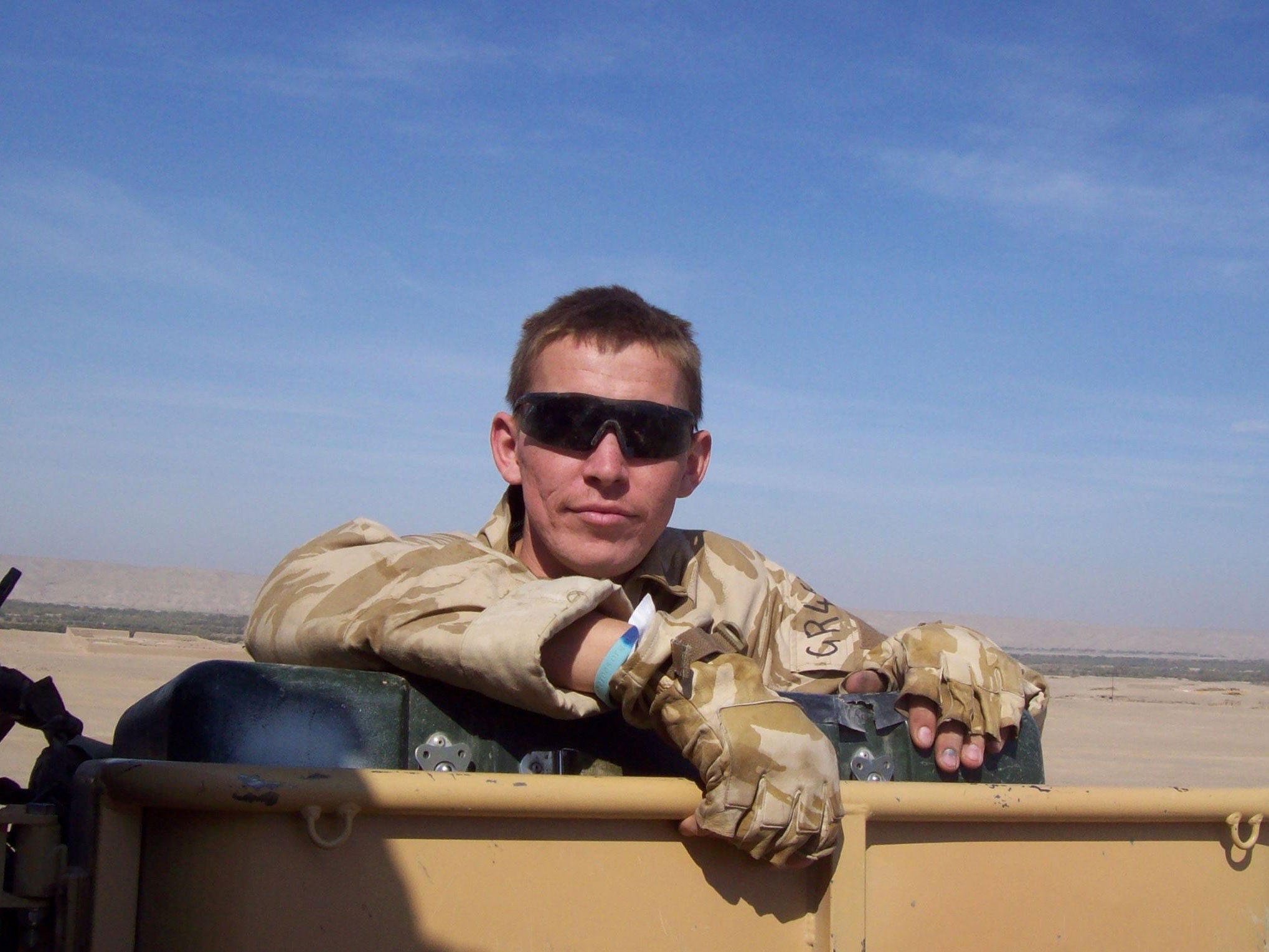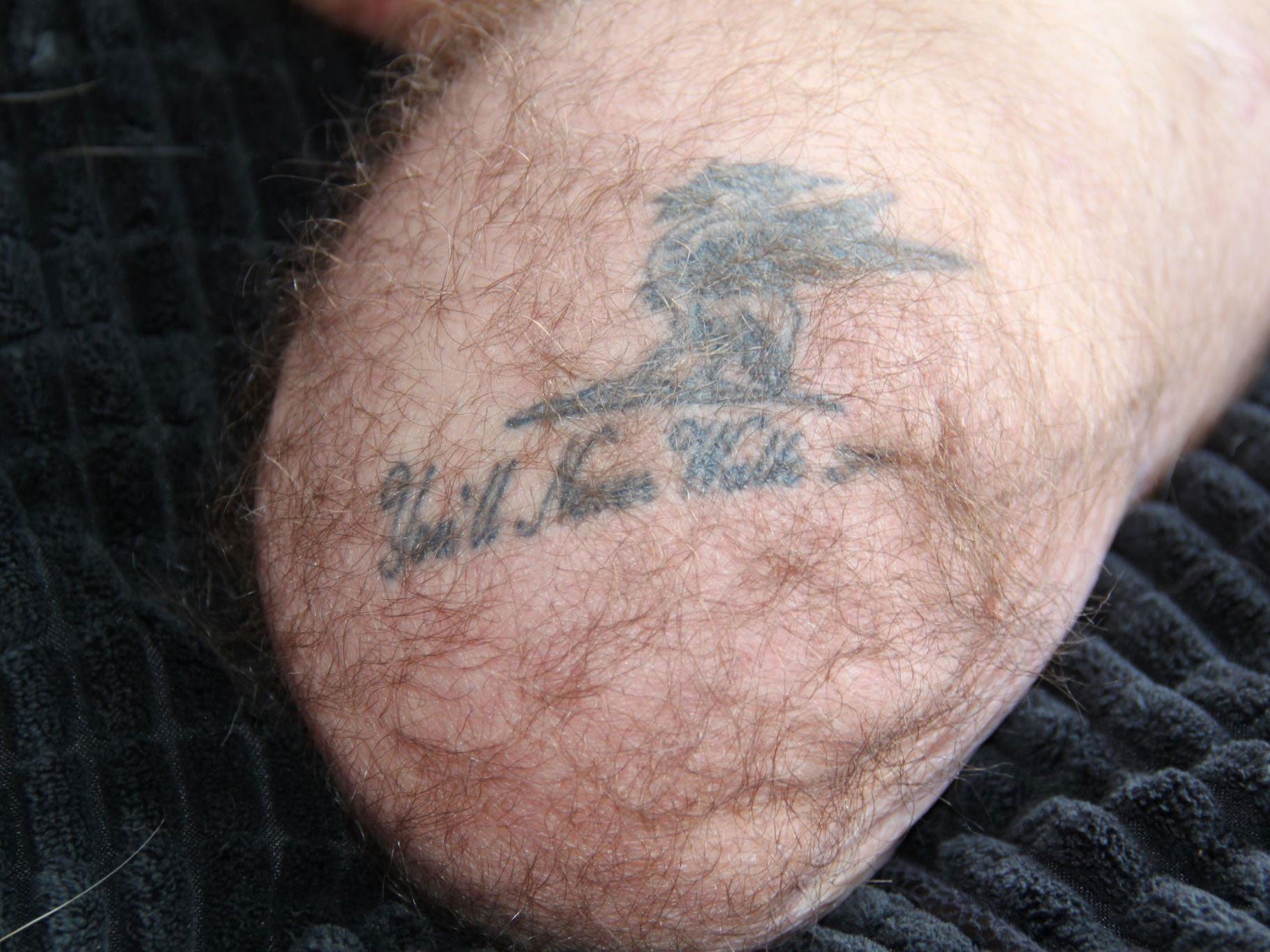‘I’m grateful for being blown up in Afghanistan’: How Andy Grant went from royal marine to record-breaking amputee
The 29-year-old Liverpool fan has a tattoo that famously now reads ‘You'll Never Walk’ due to where his leg was amputated

Your support helps us to tell the story
From reproductive rights to climate change to Big Tech, The Independent is on the ground when the story is developing. Whether it's investigating the financials of Elon Musk's pro-Trump PAC or producing our latest documentary, 'The A Word', which shines a light on the American women fighting for reproductive rights, we know how important it is to parse out the facts from the messaging.
At such a critical moment in US history, we need reporters on the ground. Your donation allows us to keep sending journalists to speak to both sides of the story.
The Independent is trusted by Americans across the entire political spectrum. And unlike many other quality news outlets, we choose not to lock Americans out of our reporting and analysis with paywalls. We believe quality journalism should be available to everyone, paid for by those who can afford it.
Your support makes all the difference.In the afternoon sun looking out over St John’s Gardens, it’s easy to forget the rain that decorated the Liverpudlian park a few hours ago. The only complaints might come from those without sun cream, clutching a waterproof jacket they now don’t need. But one person greeting the pleasant weather with a warming smile is a man you wouldn’t want to make that petty protest to.
Andy Grant has braved the heaviest of storms, from losing his mother to leukaemia at just 12, to being hit by a bomb in Afghanistan at 20, and subsequently having his right leg amputated. It’s easy to highlight the debilitating hardships he’s had to endure. But the story this former royal marine carries with him, and more importantly, what he’s done in response to everything he’s been through, would leave anyone thankful for what they have.
It was February 2009 on a routine foot patrol when Andy was hit by an IED (improvised explosive device). He had been on tour with the armed forces in the Middle East for five months, and so he’d grown accustomed a lifestyle of fighting the Taliban and bonding with his team.
“It was never ever blasé, but it had just become another day in the office,” he says with a shrug. “It was just another patrol, I never thought, this would be the day I’d get blown up. I knew my job really well, I knew the lay of the ground really well. Unfortunately, it was just a bad day at the office.”
Leading the way on their mission was Andy’s best friend Ian who, just ahead of him, activated the trip-wire. Ian luckily escaped without any serious injuries as he was thrown forwards by the blast, but Andy took the full brunt of the shrapnel. A rapid response from his team saw him heading back to Camp Bastion on a helicopter in time to perform two life-saving operations. The next time he was conscious was safe in a Birmingham hospital two weeks later.
“I guess looking back now I probably only had a few more minutes to live,” he says, “I don’t remember having one of these ‘I’m going to die’ moments, but I was definitely was becoming drowsy and the guys were just saying ‘Andy, keep talking’.
“The golden rule is that they say 99 per cent of the time if you get placed on the helicopter and you’re still breathing, chances are you’ll survive. And I just felt this huge sigh of relief that once the helicopter landed.”

Having told this part many times, the 29-year-old can recount it all vividly, and with the comfort in his tone as he sits in the shadows of St George’s Hall, one might think that was the hard part done. But the next section of his journey, both physically and mentally, was the real challenge. Due to the state of his injuries, Andy had to decide whether to amputate his right leg. Consulting surgeons advised he keep it, and, using an Ilizarov frame, grow the bones back. Being used to a fight, the former serviceman made a go of it, but it wasn’t meant to be.
“The surgeon said she could save my leg,” he says, “which she did. But she didn’t know me as a person. And she didn’t know saving my leg would mean I’d have this leg that wouldn’t really work. I could only walk. I could never run. I could never play football. I could never climb mountains.
“I almost became jealous of friends I had who were amputees who we learning to ski and learning to surf, and I thought, ‘here’s me with this. I’m grateful that I’ve still got the leg, but actually, I’m not doing anything I want to do. Life’s passing me by, and I want to take control again’.”
The struggle Andy went through was painful, with this contraption that often left him bedbound, and plunging him into binge drinking, gambling and depression. For someone so used to routine, to activity and motivational drive, it changed him for the worst. This was the teenager who saw a royal marines advert saying “99.9 per cent need not apply” as a challenge. It wasn’t his destiny to live a limited life indoors.
After 18 months of wearing the metal frame, he returned to have his leg amputated. Being a devout Liverpool FC fan, Andy had a tattoo that read “You’ll Never Walk Alone” along his right leg. Where the amputation was made just below the knee, meant after the surgery, it read, “You’ll Never Walk” – which Andy now sees the funny side of.

“Without doubt it was the right decision. I can’t even imagine what my life would be like if I’d have kept the leg to be honest. The best compliment I could pay it is that I’ve never had to turn round to anyone and say ‘sorry I can’t do this I’ve only got one leg’. It’s literally not stopped me from doing anything.”
Getting a dog – which he called “Oppo”, a term they used for each other in the marines – and joining a running club played the biggest part in helping the former serviceman back onto his feet (if you’ll excuse the phrase).
“It was massive, being around people who were like-minded and setting themselves goals. And then suddenly it goes from just wanting to go for a run, to suddenly you’re like ‘come on, I want to run round the block in five minutes now instead of six’. And then those little goals turn into targets.”
The 29-year-old’s journey then lead him to gold medals at the Invictus Games – the sporting event created by Prince Harry for injured veterans – and the desire to set himself bigger aims only grew. He learned to ski, surf, and climbed the highest mountain in South America. After failing to make the Paralympics, as “he wasn’t much of a sprinter”, Andy instead decided to set his sights on breaking a world record. Last year, ITV followed his successful attempt to become the fastest man with one leg over 10km.
“I kind of put to bed that whole idea of ‘this is Andy Grant, he got blown up in Afghanistan’. It’s like, ‘this is Andy Grant, he’s the fastest man over 10km, and that’s because he got blown up in Afghanistan’. Don’t ever judge me or feel sorry for me. Let’s go for a run, and then we can talk.”
Andy’s tale isn’t just one to glance at with respect for what he’s been through – there’s inspiration for anyone, even the mere lazy. And one that says there really is hope in facing a life of disability, to see the things you can do, rather than what you can’t.
“I’m not a good person to moan to,” he says, “In the sense that because I’ve got so many friends who are disabled, yet they’re doing so many amazing things. From friends who are blind who’ve climbed the highest mountain in North America, to a lad who’s got no legs who’s rowed the Atlantic Ocean. So I haven’t got a lot of time for people who like to moan about the little things in life.”

Asked whether he wonders what life would be like had he kept his leg, Andy says he doesn’t even dream of contemplating it. One of the toughest parts of his injury was that he also lost the ability to have children, and only through a sperm donor could he have his daughter, Alba. He doesn’t want to change a thing.
“It’s got me to a point now where I’m actually grateful for getting blown up,” he says with a smile, “which sounds really strange because obviously it wasn’t all great, but despite all the struggles, all the tough times, now that I’m out the other end of it and I look back, the positives far outweigh the negatives.”
Now a motivational speaker, Andy has told his story to thousands of people, including the academy at his beloved LFC, which he found harder than expected. He’s just released his book, aptly titled You’ll Never Walk, in which he goes into detail about his journey. Along the way he's also caught the attention of his hero, Jamie Carragher, who comes from the same town of Bootle, and who he is now able to call a friend.
“The way I view it now as I look back is life’s a roller coaster. It’s full of highs, and it’s full of lows. The highs don’t last forever, but neither do the lows. The one thing to remember is to enjoy it because you only get to ride it once.”
“I just look back and try to be grateful for everything that’s happened, because I’m in a really fortunate position.”
‘You’ll Never Walk’ by Andy Grant is available to buy in shops or online now
Join our commenting forum
Join thought-provoking conversations, follow other Independent readers and see their replies
Comments